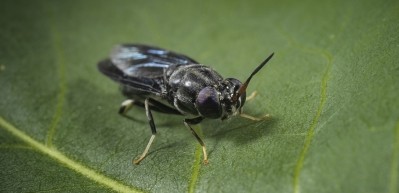Special Edition: Novel Proteins
Report: Black soldier fly market will be worth US$2.57bn in 2030

Wageningen University in the Netherlands is carrying out a four-year investigation, which kicked-off last year, into the viability of insects as a sustainable a feed source.
The availability of fishmeal has become increasingly limited with the expansion of the aquaculture industry, causing volatility in the price of the ingredient. Concerns about the deforestation link with soybean meal is also informing industry’s search for sustainable alternatives, leading to growing interest in insect derived protein.
Insect species that are mass-reared such as black soldier fly (BSF) have received significant attention mainly due to their ability to feed on different substrates including organic waste streams, according to the report.
As well as the increasing demand from the feed industry for alternative proteins, the growth of the BSF market stems from a hike in global meat demand, the development of the aquaculture industry, and more government support for the use of insect meal in livestock feed, along with investments by the key players in the BSF industry, noted the authors.
Based on product, the global BSF market is segmented into protein meal, biofertilizer (frass), whole dried larvae, larvae oil, and chitin and chitosan. BSF derived products are marketed to the feed, agriculture, pet food, and other segments.
In terms of value, the researchers found that protein meal commanded the largest share of the overall BSF market in 2019. However, in terms of volume, the biofertilizers (frass) segment took the spoils last year, and the report attributed that percentage squeeze to the fact that a large quantity of fertilizer is generated during the BSF processing compared to protein meal and oil.
Feed use of BSF derived products is predicted to see rapid growth during the forecast period, said the analysts.
Good traction in Asia-Pacific
Geographically, the Asia-Pacific region commanded the largest share of the overall BSF market in 2019, they reported. The major share of this region is mainly attributed to the increasing consumption of meat and seafood, its growing aquaculture industry, rising awareness of BSF as an alternative protein source for the use in animal feed, no regulatory hurdles, and an increase in the prices of fishmeal, wrote the authors.
Trials showed BSF and mealworm derived meal are practically equivalent in terms of digestibility, feed conversion ratio and growth performance, noted Danish fish feed group, BioMar.
However, Europe is expected to witness rapid growth during the forecast period, mainly attributed to the government approvals for the use of BSF in feed and pet food; growing funding and investments in the black soldier fly industry; and the presence of a large number of startups, commented the analysts. Factors such as high demand for protein-rich animal feed and a large supply of organic waste, including pre-consumer food waste from agriculture and food and beverage sectors, are also encouraging development of the European BSF insect farming segment, they said.
In North America and Europe, black soldier fly prices are high compared to Asian countries, especially South Korea, Japan, Malaysia, and Vietnam, given the production cost differential between North America and Europe and Asia. Moreover, in the US, the prices for BSF products are higher than in European countries, mainly due to standardized regulatory framework and low BSF production units compared to Europe, as per the publication.
Some of the key players operating in the global black soldier fly market are:
AgriProtein (South Africa)
Bioflytech (Spain)
Enterra Feed Corporation (Canada)
Entobel (Vietnam)
Entofood (Malaysia)
Entomo Farm (France)
EnviroFlight (US)
Hexafly (Ireland)
F4F (Chile)
Hermetia GmbH (Germany)
InnovaFeed (France)
Protenga (Malaysia)
Protix (The Netherlands)
The report was compiled by Meticulous Research.















